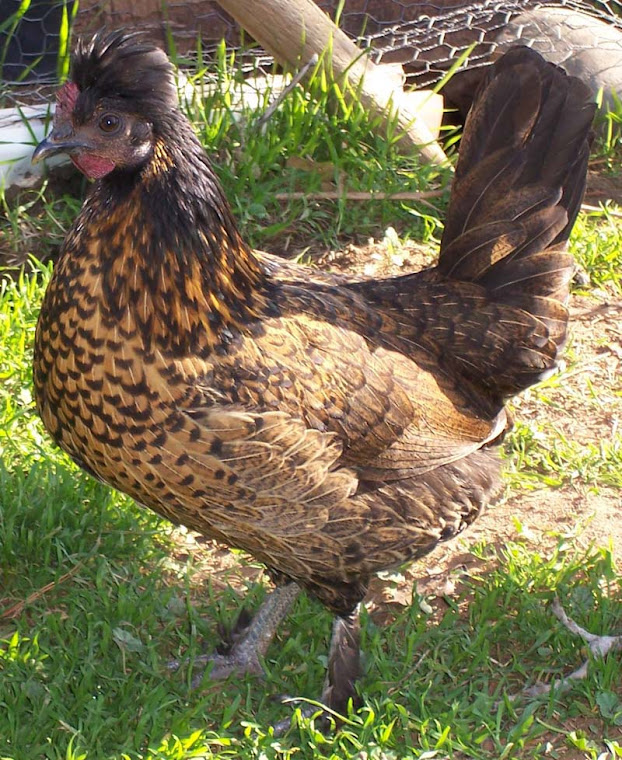Fixing chowder takes some time, and it was getting steadily colder out, so the first thing I did was to bring Hoppy inside. Hoppy is our rooster in a wheelchair. Well, really it's more of a cart. Hoppy had a narrow escape from a hawk about eighteen months ago. After a prolonged recovery from some very nasty wounds, he ended up with both legs crippled. Some experiments with a stationary sling were entirely unsatisfactory to both of us, so I built him a framework out of light scrap wood and mounted cups for feed and water on the front. Hoppy rests in a padded sling made out of polyester fleece which holds him high enough that he can get his crazy legs under him. Four model airplane wheels, with some piano wire for axles, provide him with mobility (although his capacity for turns is severely limited). When we're home, he spends the day out on the front walk, or the porch if it's rainy. The mail carrier and the UPS man have gotten used to being greeted by a little gold-and-black rooster on their way to the house.
Hoppy is, however, a creature of habit. He knows that when it gets cold out, he'll be brought inside. And once inside, he wants to be taken out of his cart and put to bed, where he can look forward to a handful of scratch grains. Although we often put him inside when headed out on errands during the day, leaving him to wheel slowly about the kitchen, he views this as a demonstration of failed intelligence on our part, and delivers a thorough scolding when we get home. In his mind, coming inside equals Bed and Scratch Now. It's very simple; even humans should get it.
But regardless, it was cold out, and getting dark, and the chowder would keep me busy for a while. So I brought Hoppy in and set him beside the kitchen table, telling him firmly that it was much too early for bed. Hoppy angled a bright brown eye up at me, ruffled his feathers contemplatively, and seemed willing to let the matter go. I washed up and began dicing bacon.
Hoppy sat patiently throughout the frying of the bacon, and the slicing of the veggies, and the sauteeing of same. But when I was in the middle of scrubbing potatoes, I heard him flap his wings, the rooster equivalent of clearing his throat.
"Rawk."
"I know, but it's too early."
Two potatoes later, and a little louder: "Raawk."
"Too early, dude. Sorry."
Several minutes elapsed in silence, apart from the whickering sound of the peeler as I divested the potatoes of their skins. Then, as I began slicing, I heard the scrabble of his toes on the linoleum, and the soft bump as he hit the bookcase. Hoppy was getting tired of waiting.
"Rawk-rawk-rawk!"
"Can I just finish the potatoes first?" I pleaded.
Hoppy appeared to consider it. I cubed potatoes as quickly as I could, wincing at the little noises behind me that signalled a rooster approaching boil. I knew it was coming, it was only a matter of time . . . and still I nearly trimmed my thumbnail with the knife when Hoppy finally blew.
"REEK-a-keer-ooo!!"
When Hoppy starts crowing in frustration, he can reach a volume comparable to a low fly-by by an F-16, and that high initial note seems like it should shatter glass. In the closed confines of the kitchen, the sound waves rebound as if homing in directly on the nearest pair of human ears. And he can keep it up for ages, seemingly unaffected by his own voice even as it pulverizes the nerves of everyone else in the room. I gave up.
"All right, all right, all right . . . ."
Hoppy kicked emphatically as I unlaced his harness and lifted him from the cart, and indulged himself in his usual "I'm flying! I'm flying!" flapping while being carried from the kitchen. Moments later he was ensconced in his tub atop the dryer, happily tucking into the promised handful of scratch. I went back to my potatoes, and finished the rest of the chowder prep without interruption. When I went out to fetch in Quercus, Hoppy was dozing contentedly on his towel.
He's not a difficult bird, really. But he does have his little ways.
 |
| Hoppy, in his wheelchair. I took up the food and water cups so that he could get at the grass, but he was more interested in the camera. |

